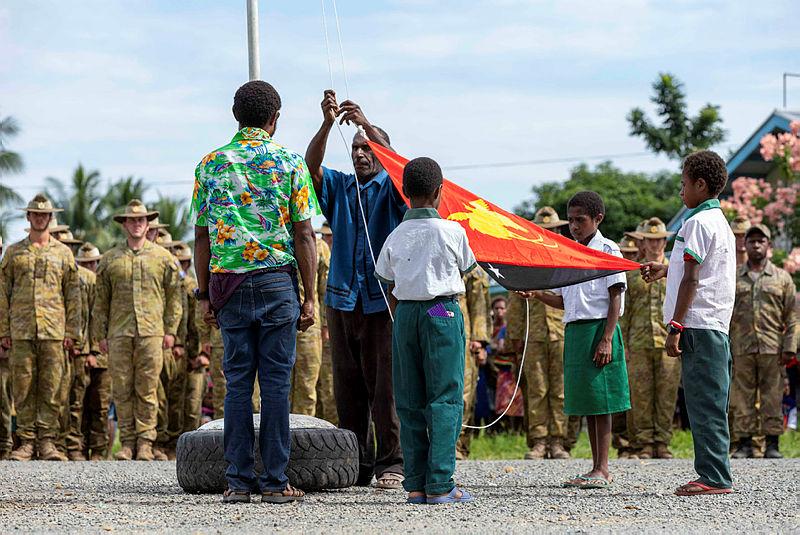Protecting democracy in Papua New Guinea
Posted By Jeffrey Wall on March 17, 2020 @ 11:00

One of the questions frequently asked about Australia’s closest neighbour, Papua New Guinea, is whether a military, or other, coup is possible.
Over the 40-plus years of my association with PNG, my view has been consistent—it is possible but fortunately highly unlikely.
There are two reasons why I have always been confident in this assessment.
First, the basics of PNG’s parliamentary democracy are reasonably secure and stable. PNG has a modern and generally relevant national constitution, a robustly independent judiciary, a generally free press (more recently joined by a growing social media presence and influence), and most important of all a vibrant national parliament—even with its many imperfections.
The second reason for my confidence is somewhat more complex, but nonetheless critical.
When PNG gained independence the founding leaders, such as Michael Somare and Julius Chan, showed great wisdom in ensuring that the newly raised PNG Defence Force established and maintained a ‘balance’ across the country’s administrative regions in the recruitment and training of personnel.
I had the privilege of mentoring the PNGDF’s first commander, Brigadier General Ted Diro, when he left the defence force and won a seat in parliament at the 1982 national elections. Maintaining the regional balance is something he discussed with me, and he regarded it as one of the most important achievements of his term as commander.
The balance was clearly designed to ensure that harmony and discipline within the fledgling force were maintained, and that young men and women from all parts of PNG could serve the nation in the defence force.
Even though it was largely unwritten, and not enshrined in the constitution adopted at independence, the policy was clearly designed to ensure that none of Papua New Guinea’s four regions (Highlands, Southern, Momase and Islands) could dominate numerically, even though historical factors did see officers from the Southern Region hold more senior positions in the period after independence.
Over the years since 1975, the leadership of the PNGDF was broadly shared by officers drawn from all regions, and care was exercised in the recruitment process to ensure proportionate representation.
There’s been no doubt in my mind since I first went to PNG in 1977 that the commitment to fair representation of all four regions in the recruitment and training process has been an important factor in ensuring the military has generally stayed out of politics and upheld its role as a disciplined force.
The defence force deserves considerable credit for its non-interference in PNG’s vibrant political process despite the fact that the military has been woefully underfunded by successive governments, resulting in limited recruitment until recently, inadequate pay and conditions (especially housing), and a lack of equipment.
There have been demonstrations, and worse, but given the inadequate attention the force has received that’s hardly surprising.
The one attempt at a ‘coup’, if it rates as such, was actually initiated by the then police commissioner, Paul Tohian, 30 years ago when the national government led by Rabbie Namaliu (whom I advised at the time and for many years after) negotiated a ceasefire with the Bougainville Revolutionary Army to enable the withdrawal of PNGDF personnel who had been sent to Bougainville when the rebellion broke out in 1989.
Tohian strongly opposed the ceasefire. He had overall responsibility for the disciplined forces— defence and police—during the state of emergency on Bougainville, but he was overruled by the national government.
The attempt lasted but a few hours and Tohian’s call to both defence and police personnel to join him in bringing down the government attracted almost no support either from the leadership or from the rank and file.
I was in Port Moresby at the time working on some key strategies for Namaliu. I regarded Tohian as a friend, having worked with him during the successful state of emergency to reduce crime in Port Moresby some years earlier. I was quickly briefed on the unfolding events and didn’t feel at all threatened as it became apparent that he was acting more out of frustration than anything else.
Now, however, there’s credible evidence that the crucial maintenance of balance in the PNGDF has been put at risk.
Social media is remarkably robust in PNG—not always accurate, but always forthright.
Newspaper The National reported [1] that a PNGDF recruitment team was stood down after claims emerged on social media that of the 320 recruits currently undergoing training at Goldie Recruit Training Depot near Port Moresby, 253 are Highlanders, 37 are from Momase, 16 are from the Islands Region, and just 14 are from the Southern Region.
There’s rightly growing alarm at those numbers. It is absolutely contrary to the careful approach successive governments, and disciplined force leaders, have adopted since independence.
If not dealt with the very stability of the defence force will be at risk. The balance put in place at independence has served the national interest generally well.
A vibrant democracy in Papua New Guinea is not just vital for our closest neighbour as it deals with critical economic and social challenges. It is also clearly in Australia’s interests for democracy and stability among the almost 9 million Papua New Guineans who are our neighbours and friends to be encouraged in every way.
A PNGDF that doesn’t have the balance the country’s founding leaders insisted on is a potential long-term risk to the stability of the country and its democratic systems.
Article printed from The Strategist: https://aspistrategist.ru
URL to article: /protecting-democracy-in-papua-new-guinea/
URLs in this post:
[1] reported: https://www.thenational.com.pg/recruitment-team-stood-down-over-claims-of-bias/
Click here to print.